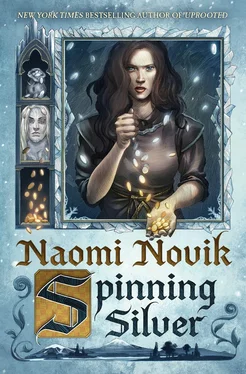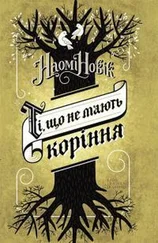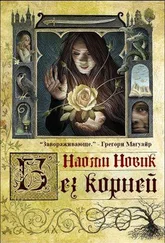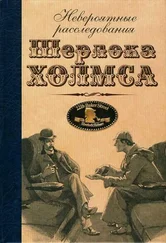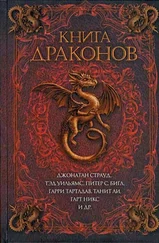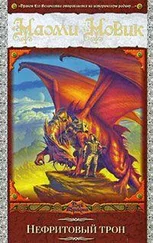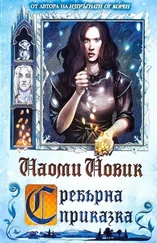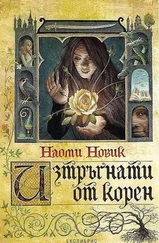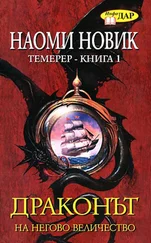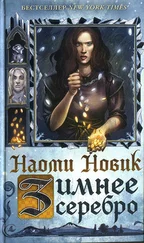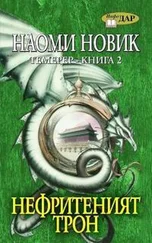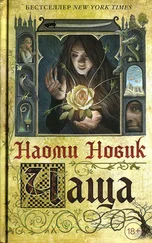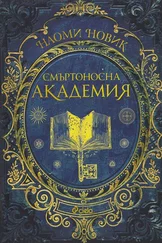Наоми Новик - Spinning Silver
Здесь есть возможность читать онлайн «Наоми Новик - Spinning Silver» весь текст электронной книги совершенно бесплатно (целиком полную версию без сокращений). В некоторых случаях можно слушать аудио, скачать через торрент в формате fb2 и присутствует краткое содержание. Год выпуска: 2018, Издательство: Random House Publishing Group, Жанр: Фэнтези, fairy_fantasy, на английском языке. Описание произведения, (предисловие) а так же отзывы посетителей доступны на портале библиотеки ЛибКат.
- Название:Spinning Silver
- Автор:
- Издательство:Random House Publishing Group
- Жанр:
- Год:2018
- ISBN:нет данных
- Рейтинг книги:5 / 5. Голосов: 1
-
Избранное:Добавить в избранное
- Отзывы:
-
Ваша оценка:
- 100
- 1
- 2
- 3
- 4
- 5
Spinning Silver: краткое содержание, описание и аннотация
Предлагаем к чтению аннотацию, описание, краткое содержание или предисловие (зависит от того, что написал сам автор книги «Spinning Silver»). Если вы не нашли необходимую информацию о книге — напишите в комментариях, мы постараемся отыскать её.
, called "a very enjoyable fantasy with the air of a modern classic" by empty-line
2
Uprooted
Spinning Silver — читать онлайн бесплатно полную книгу (весь текст) целиком
Ниже представлен текст книги, разбитый по страницам. Система сохранения места последней прочитанной страницы, позволяет с удобством читать онлайн бесплатно книгу «Spinning Silver», без необходимости каждый раз заново искать на чём Вы остановились. Поставьте закладку, и сможете в любой момент перейти на страницу, на которой закончили чтение.
Интервал:
Закладка:
I carried a big sturdy basket and I put inside it everything they gave me. Miryem was worried I would forget who gave what, but I didn’t forget. I remembered every coin and all the different goods. She wrote it all down in her big black book, the thick goose-feather pen scratching surely in her hand without a pause. On market day, she would sort out any goods she did not want to keep, and I would follow her with the basket into town. She sold and traded until the basket was empty and the purse she carried full, turning cloth and fruit and buttons into coins. Sometimes she took another step first: if a farmer had given her ten skeins of wool, she would take them to a weaver in her debt and have her work off a payment in making it into a cloak; then she would sell the cloak in the market.
And at the end of the day she would pour out a lake of pennies on the floor and roll them in paper to turn them into silver; one roll of pennies the length of my ring finger was the same as a kopek. I knew because when she took that roll into the market the next time, very early in the morning, she would find a merchant who had traveled in from out of the town, still putting up his stand, and she would give him that roll and he would open it and count the pennies and then he would give her one silver kopek back. The silver coins she did not spend or change in the market. She brought them home and rolled them in paper also, and a roll as long as my little finger, that was the same as a coin of gold. She put them away into the leather purse her grandfather had given her. I never saw that purse except on market days, and on market days it was out on the table when I came, and it stayed there until after I had gone for the day. She did not hide it or take it out where I could see, and her father and her mother never touched it.
I didn’t understand how she guessed how much each thing would be worth to someone else, when she didn’t care to keep them herself. But little by little I learned to read the numbers she wrote down in her book when she valued the payments, and when I overheard the prices she got in the market, the two were nearly the same, every time. I wanted to understand how she did it. But I didn’t ask. I knew she only thought of me as a horse or an ox, something dull and silent and strong. I felt so, around her and her family. They talked all the day it seemed to me: talked or sang or even argued. But there was never shouting or raised hands. They were always touching one another. Her mother would put a hand on Miryem’s cheek or her father would kiss her on the head, whenever she passed nearby. Sometimes when I left their house at the end of the day, once I was down the road and into the fields and out of sight, I would put my hand on the back of my head, my hand that had grown big and heavy and strong, and I tried to remember the feeling of my own mother’s hand.
In my house there was only a silence like solid earth. We had gone a little hungry all the winter, even me with my extra dinner. I had a walk of six miles to go with it. Now spring was here, but we were all still hungry. When I walked home I picked up mushrooms and if I was lucky a wild turnip and whatever greens I saw. There were not many. Most of them we could not eat. Those went to the goats. Then in our garden I dug some of the new potatoes, which were too young to be worth eating but we ate them anyway. I would cut off the smallest piece with an eye and bury it again. I went inside and stirred up the coals under the pot that I had put on in the morning with our cabbage. I put the small lumps of potatoes in with whatever else I had found. We ate sitting around the table with our heads bent, never speaking.
Nothing grew well. The ground stayed packed hard and cold into April, and the rye grew sluggishly. When at last Da was able to start planting beans, a week later snow fell again and killed half the plants. That morning when I woke I thought it was still night. But it was stone-grey outside, and snow was coming down so we could not see the neighbor’s fence. Da started cursing and cuffed us out of bed. We all hurried outside to bring in the goats, the five baby goats. One of them was already dead. The rest we brought into the house with their mothers. They brayed and chewed our blankets and nearly got into the fire, but they stayed alive. After the snow stopped, we butchered the dead one and salted what little meat there was. I made soup of the bones and we ate the liver and lungs. For one day we weren’t hungry.
Sergey could have eaten three times his share. He was starting to get big himself. I thought he was hunting sometimes, even though he knew he would be hanged for poaching, or worse if he was taking them from the forest. The only animals we could take from the forest were the marked ones, the ones with some spot of black or brown. But there were almost none like that left, and the white animals, all white, belonged to the Staryk. I did not know what they would do to someone who hunted their animals, because nobody did it, but I knew they would do something. You could not take anything from the Staryk that was theirs. They came and stole from people, but they did not like it when anyone stole from them.
But sometimes Sergey came in and ate without looking up, without stopping, his full share, the same way I ate mine. As if he knew he had eaten more than the others at the table. So I thought he was hunting where no one else saw. I did not tell him not to do it: he knew. Anyway it was not the same in my house as the moneylender’s house. I did not think the word love. Love was buried with my mother. Sergey and Stepon were only more of the babies who made my mother sick. They had not died, but so they had made even more work for her and now me. They ate some of the food, and I had to spin the goats’ wool and knit and wash their clothes. So I did not worry very much about what if the Staryk did something to Sergey. I did think maybe I should tell him to bring me the bones to make soup, but then I thought, if we all ate, we would all be in trouble, and not worth it just for some cracked bones he had already sucked clean.
But Stepon did love Sergey. I had made Sergey take care of him, when my mother died. I was eleven and I could spin, and Sergey was only seven years old, so Da let me. By the time Sergey was big enough to go to the fields, he had gotten used to putting up with Stepon and didn’t push him back on me. Stepon would follow him and keep out of the way and bring them water. He helped with the goats, and together they could sleep warm out of the house if my father was angry, even in winter. Sergey would cuff him sometimes but not very hard.
So Stepon came to me the day Sergey got sick. It was not yet noon. I was working in the moneylender’s garden, cutting off the heads of their cabbages. They were not really ready yet, but that night it had frozen a little, even though it was still early in autumn, and Miryem had said better to bring them in for what good they would be. I kept an eye on the door. Soon it would open and the moneylender’s wife would call me inside for dinner. That morning there had been a crust of stale bread in among the grain to go to the hens, and I had taken it myself and gnawed it up bit by bit, making it soft in my mouth with swallows of water out of the rain barrel, cold from under a crust of ice, but my belly was still pinched tight. I was looking at the door again when Stepon cried, “Wanda!” He was leaning on the fence breathing in big gulps. “Wanda!”
When he shouted my name I jerked as though Da had come down on my back with a switch. “What is it?” I was angry with Stepon for coming. I didn’t want him there.
“Wanda, come,” he said, beckoning me. He never talked much. Sergey understood him without talking, most of the time, and when my father filled our house with his voice, he got out of it if he could. “Wanda, come.”
Читать дальшеИнтервал:
Закладка:
Похожие книги на «Spinning Silver»
Представляем Вашему вниманию похожие книги на «Spinning Silver» списком для выбора. Мы отобрали схожую по названию и смыслу литературу в надежде предоставить читателям больше вариантов отыскать новые, интересные, ещё непрочитанные произведения.
Обсуждение, отзывы о книге «Spinning Silver» и просто собственные мнения читателей. Оставьте ваши комментарии, напишите, что Вы думаете о произведении, его смысле или главных героях. Укажите что конкретно понравилось, а что нет, и почему Вы так считаете.
